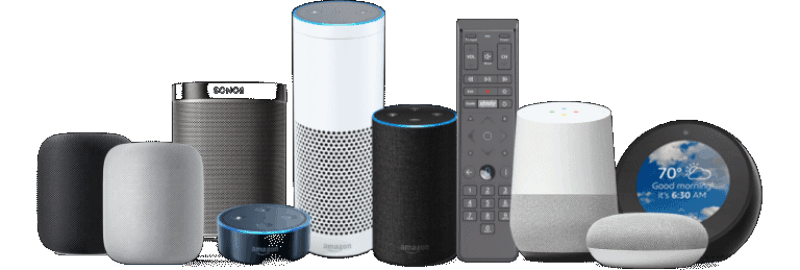Voice – The New Super Aggregator
With a New Year starting it’s always fun to look ahead at what technology might be bringing us. One of the most exciting tech developments over the last few years has been the rise of voice devices. At our home, we have settled on Amazon Echo Dots but others such as Google Home are no doubt equally competent. I have three Dots dotted around the house. I can control lights and heating as well as having access to music, radio and information.
I ordered my first Echo Dot in September 2016, so we have had these devices at home for just over three years. They are now just part of our life, to be used when convenient, like a tap or a light switch. Our first Echo Dot cost £49.99 but the price has now halved to £24.99 (or less if you catch one in the sale). That’s not much money for a lot of technology and the Google Home Mini is even cheaper.
We have grown accustomed to talking to Alexa who resides in the Echo but I have not yet been emboldened enough to make any purchases through the device. Shopping is available. Alexa has ‘Skills’ for Morrison, Sainsbury’s, Ocado and many other shopping facilities. Examples of using these skills are commands such as “Add bread to my trolley” or “Where is my order?” There might be a few teething bugs. For example, one user review says, “Easy works first time! Just kidding this is as much fun as a fortnight at the dentist.”
Technology has to start somewhere and it can only get better, so let’s wind forward a few years. Firstly, I would imagine that more of us will be using voice devices with screens, such as the Echo Show. If we are going to start purchasing items through a voice device I think it is essentially comforting to have visual confirmation of what you are buying. However, the big advance is going to be the increase in intelligence that sits behind the voice devices. I could envisage them developing into voiced based intelligent assistants or agents.
Wikipedia mentions a class of agent called Buyer Agents or Shopping Bots, “travelling around a network (ie. the internet) retrieving information about goods and services. These work very efficiently for commodity products such as CDs, books, electronic components, and other one-size-fits-all products. Buyer agents are typically optimized to allow for digital payment services used in e-commerce and traditional businesses.”
What commodity product might we have in travel? Flights, of course. I have to travel to Milan for a meeting in the next month. I am not bothered about which airline I fly. The departure and arrival airports are important and so is the price. (Cheapest fare £23 return. Unbelievable!)
I can certainly envisage one day telling my voice agent to find me flights from London to Milan on 29 Jan, returning on 30 Jan. The agent would display on-screen what it has found and I would tell it to book journey number 2, number 3 or whichever is right for me. Next time I travel to Milan I would expect my voice agent to remember which flights I preferred last time and offer these at the top of its list of choices.
In this scenario the voice device is my agent and is acting as a super-aggregator. I would have expected the device to have examined many sources of information to find my flights. Some may have been airlines, some will have been aggregators or OTAs. I really won’t care – my credit card company will be protecting me should an airline or retailer go bust and, as I have said on many an occasion, easy is the new loyalty. My voice device made this booking so easy and quick to transact, why would I have done it any other way?
Once many of us are buying flights and other transport by voice, what’s next, accommodation, package holidays? Slowly but surely voice will commoditise travel along with other retail industries.
Voice becomes the new super-aggregator. And so to the question: Who wins and who loses? What do you think?
